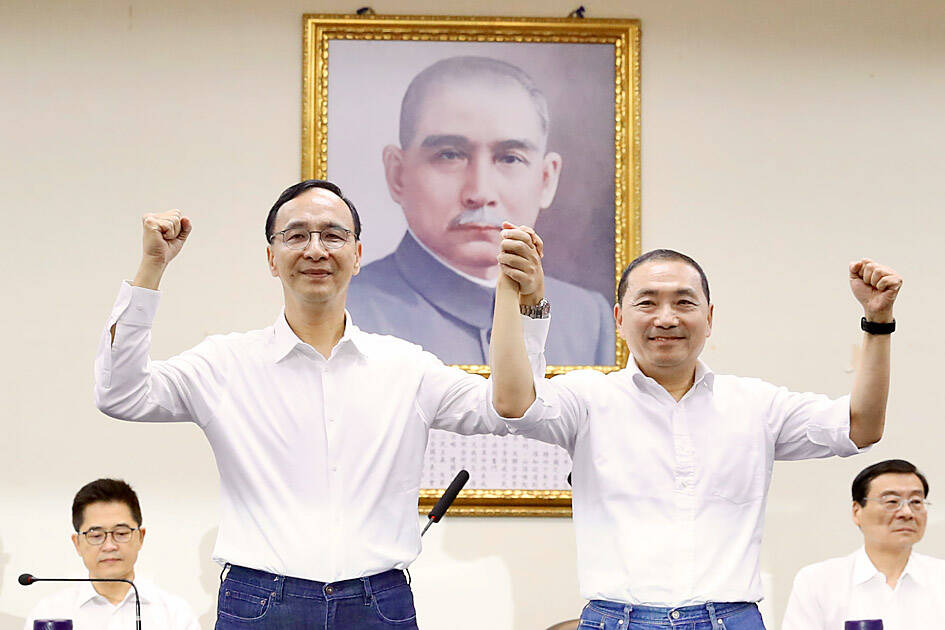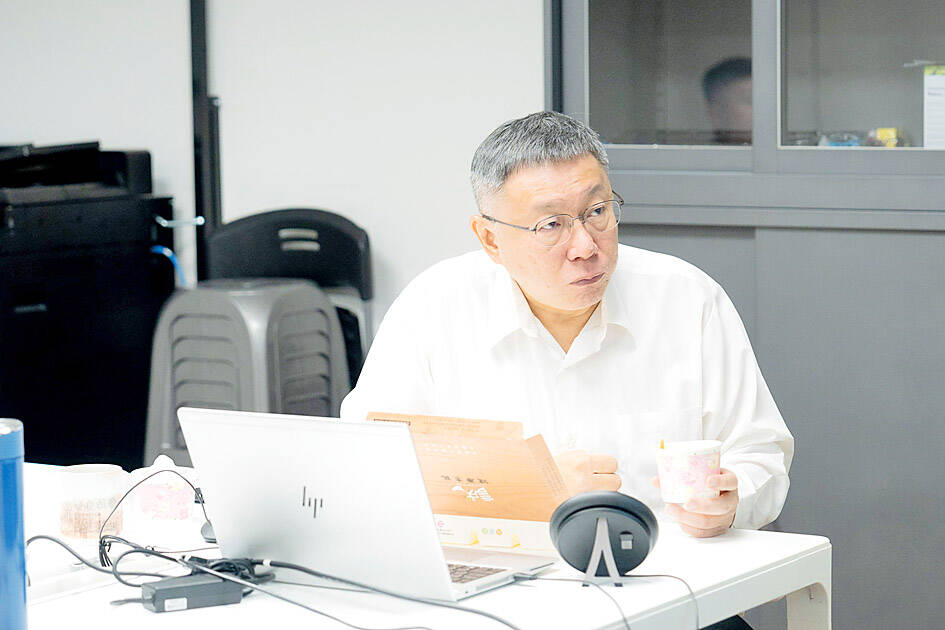The Chinese Nationalist Party (KMT) yesterday nominated New Taipei City Mayor Hou You-yi (侯友宜) as its candidate for next year’s presidential election.
Hon Hai Precision Industry Co founder Terry Gou (郭台銘), who was the other main contender for the KMT nomination, said he would support Hou’s campaign.
KMT Chairman Eric Chu (朱立倫) announced Hou’s nomination at a meeting of the KMT’s Central Standing Committee, which in March tasked Chu with choosing a candidate with the best chance to defeating the ruling Democratic Progressive Party (DPP).

Photo: Ritchie B. Tongo, EPA-EFE
After considering “scientific data and the opinions of local government heads and lawmakers... I solemnly declare that our party has drafted Hou You-yi to run in the Republic of China’s [ROC] 2024 presidential election,” Chu said.
Hou, 65, had been coy about running for president, presumably because he did not want to seem eager to pursue the presidency so soon after being re-elected mayor in November last year.
However, he recently expressed his opinions on Taiwan’s relations with China, purportedly to establish his credentials on major issues before accepting the KMT’s nomination.

Photo: CNA
Last month, Hou said the ROC and Taiwan were like “cup and water,” urging Taiwanese to reach a consensus on that “inseparable” relationship and calling on the international community to recognize the ROC’s existence.
Gou, on the other hand, had advocated accepting the so-called “1992 consensus” to resume dialogue with Beijing and maintain cross-strait peace.
One hour before the committee met yesterday, Gou voiced his support for Hou in a Facebook post, congratulating the mayor on his nomination.
“Mayor Hou has the most solid public support, so it is only natural for him to assume greater responsibility. He is also the best candidate within the KMT,” Gou wrote.
“I will keep my promise and do everything I can to support Mayor Hou to win the 2024 election and get rid of the incompetent government,” he wrote.
Meanwhile, the Taiwan People’s Party (TPP) officially nominated party founder and Chairman Ko Wen-je (柯文哲) as its presidential candidate, setting up a three-way race for the presidency, after the DPP last month nominated Vice President William Lai (賴清德) as its candidate.
Ko was the only TPP member seeking the party’s nomination and his candidacy had been a foregone conclusion for months. His registration information was reviewed by the TPP Central Committee, which approved it at a meeting.
Ko is expected to present his platform, centered on “harmony, reconciliation and peace,” in New Taipei City on Saturday.
Earlier this month, when asked by reporters who his running mate would be, Ko said the TPP welcomed anyone who fit the bill to sign on. He added that Vivian Huang (黃珊珊), one of his deputy mayors during his second mayoral term, would be a “fine candidate.”
There had been speculation that Ko might seek a partnership with Gou, but Ko during a radio interview with former New Power Party legislator Huang Kuo-chang (黃國昌) on Tuesday said Gou was apparently not interested in partnering with him.
Polls have shown Ko to have a support rating of 20 to 25 percent.
As the TPP’s main support base is made up of pan-blue and pan-green camp voters, Ko’s entry into the race has increased the unpredictability of the outcome.
The “1992 consensus,” a term former Mainland Affairs Council chairman Su Chi (蘇起) in 2006 admitted making up in 2000, refers to a tacit understanding between the KMT and the Chinese government that both sides of the Taiwan Strait acknowledge there is “one China,” with each side having its own interpretation of what “China” means.

MAKING WAVES: China’s maritime militia could become a nontraditional threat in war, clogging up shipping lanes to prevent US or Japanese intervention, a report said About 1,900 Chinese ships flying flags of convenience and fishing vessels that participated in China’s military exercises around Taiwan last month and in January last year have been listed for monitoring, Coast Guard Administration (CGA) Deputy Director-General Hsieh Ching-chin (謝慶欽) said yesterday. Following amendments to the Commercial Port Act (商港法) and the Law of Ships (船舶法) last month, the CGA can designate possible berthing areas or deny ports of call for vessels suspected of loitering around areas where undersea cables can be accessed, Oceans Affairs Council Minister Kuan Bi-ling (管碧玲) said. The list of suspected ships, originally 300, had risen to about

DAREDEVIL: Honnold said it had always been a dream of his to climb Taipei 101, while a Netflix producer said the skyscraper was ‘a real icon of this country’ US climber Alex Honnold yesterday took on Taiwan’s tallest building, becoming the first person to scale Taipei 101 without a rope, harness or safety net. Hundreds of spectators gathered at the base of the 101-story skyscraper to watch Honnold, 40, embark on his daredevil feat, which was also broadcast live on Netflix. Dressed in a red T-shirt and yellow custom-made climbing shoes, Honnold swiftly moved up the southeast face of the glass and steel building. At one point, he stepped onto a platform midway up to wave down at fans and onlookers who were taking photos. People watching from inside

Japan’s strategic alliance with the US would collapse if Tokyo were to turn away from a conflict in Taiwan, Japanese Prime Minister Sanae Takaichi said yesterday, but distanced herself from previous comments that suggested a possible military response in such an event. Takaichi expressed her latest views on a nationally broadcast TV program late on Monday, where an opposition party leader criticized her for igniting tensions with China with the earlier remarks. Ties between Japan and China have sunk to the worst level in years after Takaichi said in November that a hypothetical Chinese attack on Taiwan could bring about a Japanese

STREAMLINED: The dedicated funding would allow the US to transfer equipment to Taiwan when needed and order upgraded replacements for stockpiles, a source said The US House of Representatives on Thursday passed a defense appropriations bill totaling US$838.7 billion, of which US$1 billion is to be allocated to reinforcing security cooperation with Taiwan and US$150 million to replace defense articles provided to the nation. These are part of the Consolidated Appropriation Act, which the US House yesterday passed with 341 votes in favor and 88 against. The act must be passed by the US Senate before Friday next week to avoid another government shutdown. The US House Committee on Appropriations on Monday unveiled the act, saying that it allocates US$1 billion for the Taiwan Security Cooperation Initiative